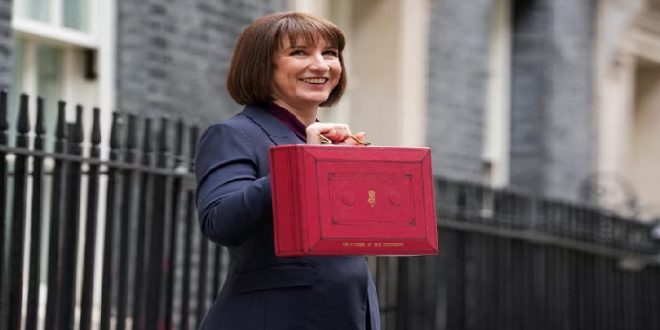01-11-2024
LONDON: Britain’s new finance minister Rachel Reeves announced the biggest tax increases in three decades in her first budget on Wednesday, saying she had to repair the country’s broken public services with heavy spending.
 Businesses and the wealthy faced the brunt of the tax hikes and Reeves also paved the way for higher borrowing for investment to speed up an economy hit by the 2007-09 financial crisis, Brexit, COVID and soaring energy prices.
Businesses and the wealthy faced the brunt of the tax hikes and Reeves also paved the way for higher borrowing for investment to speed up an economy hit by the 2007-09 financial crisis, Brexit, COVID and soaring energy prices.
The former Bank of England economist who told parliament of her pride at being the first female Chancellor of the Exchequer vowed no repeat of former Prime Minister Liz Truss’s unfunded tax cuts which caused a bond slump in 2022.
Investors were initially unfazed by the Labour Party’s economic program but government bond prices fell later as the scale of the planned spending became clear and investors scaled back their bets on Bank of England interest rate cuts next year.
Reeves said she would raise taxes by 40 billion pounds ($52 billion) a year, blaming the Conservatives for leaving her Labour Party with a budget “black hole”.
“Any responsible Chancellor would take action,” she said. “That is why today, I am restoring stability to our public finances and rebuilding our public services.”
She painted a grim picture of record waiting times in the health service, children studying in crumbling schools and dysfunctional transport and justice systems but in a setback for Reeves, Britain’s budget watchdog said the economy would grow less than it previously thought in 2026-2028 after outperforming only slightly in 2024 and 2025.
The watchdog said higher public investment was likely to boost growth but mostly only in the 2030s.
“This is, in some sense, the central trade-off of this budget,” Ben Zaranko, an economist with the Institute for Fiscal Studies think tank, said. “Tens of billions of extra borrowing for investment might push up interest rates but that’s seen as a price worth paying for the long-term benefits.”
 Reeves’ plans will take the government’s tax take to a historic high of 38.2% of economic output by 2030. That is still lower than in many other European economies but is up from 36.4% now and more than 5 points higher than before the pandemic.
Reeves’ plans will take the government’s tax take to a historic high of 38.2% of economic output by 2030. That is still lower than in many other European economies but is up from 36.4% now and more than 5 points higher than before the pandemic.
According to the IFS, tax hikes of 40 billion pounds would be equivalent to 1.25% of economic output, surpassed in recent history only in 1993 by a budget plan under the Conservatives. Prime Minister Keir Starmer had said the budget would target “those with the broadest shoulders” to spare “working people.”
The yield on 10-year British government bonds which moves in the opposite direction to prices was up by about three basis points in late trade after dropping during Reeves’ speech.
Investors were pricing fewer BoE interest rate cuts in 2025 given the inflationary impact of higher government spending.
Reeves announced a string of tax increases to meet her new rule for day-to-day spending to be in balance by 2030.
The rate of social security contributions paid by employers will rise by 1.2 percentage points to 15% from April, and a threshold at which firms start paying it will fall, generating an extra 25 billion pounds a year in five years’ time.
Company bosses warned that higher taxes, combined with planned new protections for workers and minimum wage rises, could undermine Labour’s growth ambitions.
“This is a tough budget for business,” Rain Newton-Smith, the Confederation of British Industry’s chief executive, said.
A cap on a tax on business profits was welcome but the overall rise in employer costs would “hit the ability to invest and ultimately make it more expensive to hire people or give pay rises,” she said. (Int’l Monitoring Desk)
 Pressmediaofindia
Pressmediaofindia




